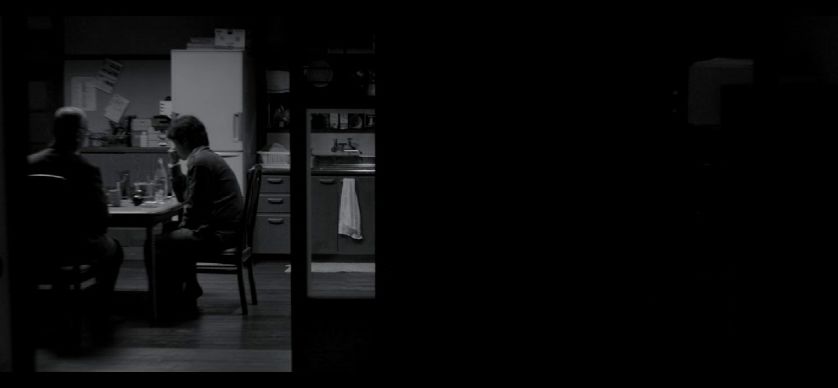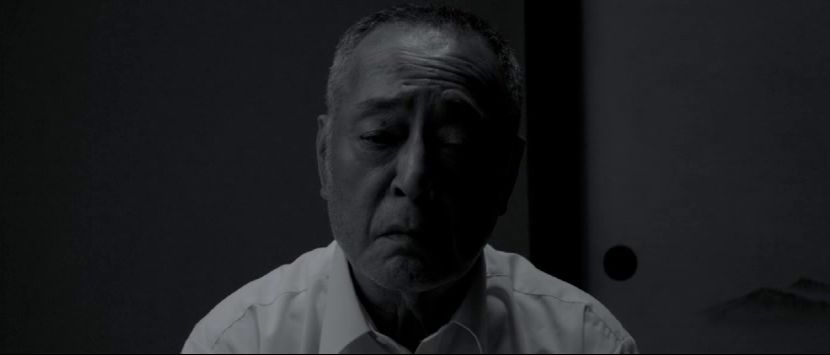A kitchen is one of the three settings in Masahiro Kobayashi’s Japan’s Tragedy (Nihon no higeki, 2012), and the table is the most prominent piece of furniture in this small room. An open sliding door offering a view into a small hallway and the adjacent bedroom creates some depth in the film’s opening eleven-minute scene, which takes place in the kitchen and is filmed as one shot. The camera remains static throughout the film, consisting of a series of lengthy shots in the kitchen, the bedroom and the hallway between the two. Most of the action takes place in the kitchen, which is filmed from various only slightly different camera perspectives. The kitchen table is never exactly central, an avoidance of symmetry that subtly challenges the idea of harmony. For one of the kitchen scenes, the camera is located in the bedroom and most of the image is plunged into complete darkness, creating a black space on the right-hand side of the screen and giving an overall impression of complete imbalance.

The two characters in the opening scene are the retired carpenter Fujio Murai (Tatsuya Nakadai) and his son Yoshio (Kazuki Kitamura). Through the open sliding door one can see in the neighbouring room the house altar with the photograph of a smiling elderly women – a first hint to Fujio’s late wife. The viewer learns from the dialogue that Fujio has just returned home from a stay in hospital. Almost immediately, father and son start to quarrel. Fujio claims that there is only one chair he can sit on, namely the chair he has always sat on, an attitude that irritates his son greatly. Yoshio wants to wash the clothes his father has worn in the hospital, but Fujio forbids him.
Tension fills the narrow space of the film’s setting from the very beginning. Fujio, terminally ill with lung cancer, vehemently refuses to undergo surgery while Yoshio tries vainly to convince his father to have further treatment. Fujio is the epitome of a stubborn elderly person, and Nakadai plays the character in his usual convincing manner. Sitting upright and practically unemotional, he reveals his character’s inner discipline and his stubbornness. However, in the flashbacks and in the scenes showing him alone in front of the photograph of his late wife, Nakadai’s facial expressions show a variety of emotions, allowing the great Japanese actor to display his talent.
Fragments of dialogue and flashbacks reveal details about the characters and their life stories. The son is unemployed and has been living on his father’s pension while the latter was in hospital. While his mother was still alive, Yoshio deliberately left the family home. Suicidal and an alcoholic, he had himself admitted to a psychiatric hospital, where he stayed for several months, giving notice of his whereabouts neither to his parents nor to his wife Tomoko (Shinobu Terajima) and his young daughter. He simply disappeared.
The father’s refusal to undergo medical treatment culminates in his decision to starve himself to death. He nails up the door to the room with the photograph of his late wife and the urn containing her ashes and is determined to die there. Refusing to eat and sleep, he threatens Yoshio that he will slit his throat if Yoshio tries to break the door down. Fujio has forgotten that the day of his return from hospital is the first anniversary of his wife’s death, and the next day, he kneels in front of her photograph, reminiscing about the past.
All the flashbacks are set in the kitchen, the place where husband and wife and/or son, daughter-in-law and grandchild spend time together. Fujio and his wife Ryoko (Akemi Omori) have an ongoing quarrel about the former’s drinking habits. However, these quarrels are never spiteful or violent, and Ryoko is a gentle woman who tries hard to keep her husband away from alcohol. In one scene, Fujio pours himself another glass of sake, taking advantage of the fact that Ryoko has left the kitchen. The expression on his face reveals his mischievous pleasure at having outwitted his wife.
However, he forgets to put the bottle back in the refrigerator, and when his wife returns, it is clearly visible in the background of the shot. However, its presence does not give rise to a quarrel and the bottle is not even mentioned in the conversation. It is instead up to the viewer to decide whether or not Ryoko will refer to it later on. The scene also shows that Fujio is not particularly clever and even suggests that in fact his wife may not need to see the bottle to know very well what Fujio did during her brief absence.
Fujio is fond of drink, but Yoshio is an alcoholic and, like his father, he smokes cigarettes. In the opening scene, Fujio warns his son of the dangers of smoking, having himself been a heavy smoker who now suffers from lung cancer. Yoshio is irritated by his father’s remarks just as he is by his stubbornness. Fujio’s intransigence angers Yoshio, who cannot understand his father’s wish to die. He thinks that Fujio has given up on him, a feeling that is the more intense against the background of other losses he has experienced in his life. He recalls the day of his return to his parents’ home after a long absence when, instead of seeing his mother again, he soon has to come to terms with the news of her sudden death.
Yoshio repeatedly tries to convince Fujio to leave his self-chosen prison and talk to him. The father refuses both requests, allowing his son to speak to him only once a day. Yoshio indulges in self-pity about losing his job and about his failure in life, behaviour that his father disapproves of, calling it “pathetic”. The younger man’s despair culminates in a long monologue that he delivers outside his father’s room. Filmed in the small hallway between the kitchen and the adjacent room, Yoshio breaks down and cries profusely, pleading with his father to regard him as a human being and someone who does not want to become the helpless witness of his (Fujio’s) death.
At the end of the film, the son is alone in the kitchen with a photograph of his father on the table, suggesting that the old man has died. Yoshio addresses him, telling that he is going out because he has another job interview, and he then leaves the apartment, its emptiness creating a spooky atmosphere. The ringing of the telephone, reverberating throughout the empty space, heightens this effect. It is left to the imagination of the viewer to decide who is trying to reach Yoshio by phone.
Japan’s Tragedy is shot in black and white. The absence of colours and the static camera reinforce the hopelessness experienced by characters unable to change their attitudes and are also a reference to the social and economic crisis that hit Japan after the end of the economic miracle. Yoshio could not cope with the pressure he had in his job and at home. Unemployment and difficulty reintegrating into society hint at the general situation in Japan in the early 2000s. The numerous suicide attempts that Yoshio refers to in conversations with his father and Fujio’s own slow suicide reflect reality in present-day Japanese society. At the end of the film, the viewer is informed that 31,560 people committed suicide in Japan in 2010.

Yoshio’s mother is an absence-presence in the film, first seen in the photograph in the background and referred to in the dialogue. Later, she is the central figure in Fujio’s memories. Yoshio depicts her as a woman full of life, and after her death, nothing remains of her energy and cheerfulness. There is, however, one scene filmed in colour, a scene in which Fujio’s only happy memory figures – the moment when Tomoko and Yoshio show the newborn Hiroko to her grandparents.
Except for this one scene, the flashbacks reveal a dysfunctional family. Fujio remembers his son’s sudden disappearance, a visit by his daughter-in-law to inform him and Ryoko of her intention to divorce and the fact that she has sent her young daughter to her parents. When Yoshio comes back home after his stay in the psychiatric hospital, he and Fujio receive a message informing them that Ryoko has collapsed in a shop. She dies shortly after. In a different flashback, father and son are in the kitchen when the room is shaken by an earthquake. It is 11th March 2011, the day the Great Tohoku earthquake hit the north-eastern coast of Japan but could also be felt in Tokyo. The camera later shows Fujio in the present, his body shaking as if reliving the terrifying moment. After the catastrophe, Yoshio cannot find out where his former wife and their daughter are and Fujio is very concerned as he remembers that Tomoko’s parents live in the Tohoku area, where the earthquake and the subsequent tsunami have caused severe damage.
Nihon no higeki, the film’s title, is the same as that of Keisuke Kinoshita’s film from 1953, but it has a completely different plot and aesthetic approach. However, both films deal with families as social microcosms, both approach the topic of suicide, and both are concerned with the problems of their time. Kinoshita gives a bleak portrait of early post-war Japan whereas Kobayashi refers to more recent disasters and present-day social fractures, dedicating his film to the memory of those who have committed suicide and the 20,000 dead and missing persons following the earthquake in 2011.

The film’s Kammerspiel character creates an intimacy that is highly appropriate to the topic of the family. However, this atmosphere is constantly challenged by the static camera, which maintains a distance from the characters. Fujio is the only one seen in close-ups, when he is filmed alone in front of the family altar, his face bearing an expression of grief and despair. The static camera is an indication of the standstill in the lives of the characters and at the same time a reference to a static society struggling with catastrophes and social unease.
